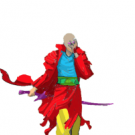-
Posts
1141 -
Joined
-
Last visited
-
Days Won
2
Ripheus23's Achievements
988
Reputation
Single Status Update
-
Dr. Atatan
One subsetting of the story is supposed to be a "school for magic" kind of scenario. Actually, there are two examples of the trope at play, but anyway, the one I'm talking about is supposed to fit the profile more normally than the other. Now I'll confess, I'm actually only aware of the following examples in the genre: Harry Potter, scenes from The Magicians and Patrick Rothfuss' Kvothe books, maybe scenes from the tower of the Aes Sedai in The Wheel of Time, and maybe some film or TV (or even videogame) examples I'm not clearly remembering right now. I feel like this is probably a short list (especially considering, IDK, anime and manga?) so I'm not sure if the following "personal touch" on the genre is original or not:
- The main antagonist is a professor.
He's not like Voldemort, then, a troubled student. I guess you could say he's like a combination of Voldemort and Dolores Umbridge or something, or that's the closest approximation, or whatever. However, there's more to it, like, it's not just that there happens to be a smart evil wizard (with or without state sanction) who poses obstacles for the students. It's rather that he's not a powerful wizard so much at all himself, and his primary negative activity is to try to influence his students into doing evil with magic.
And so more precisely, it's not even that this "Dr. Atatan" (working moniker) is getting his students to place curses on others or cast dark spells or what. Rather, the class he teaches has to do with "preparing for the advent of the Final Power." The idea is: we all know it'll happen one day, so what can we do to get ready for it? And Atatan has an evil idea, maybe he doesn't think it is, but it is.
In order for his idea to serve for some foreshadowing, I am (tentatively) setting it to this: just as it is later described, how Armirex attempts to interpose the concepts of evil and nothingness using a default in his moral logic, so it is that Atatan is misapplying the principles of the deontic operators---or, seeks to apply them in a warped way. The idea is that sometimes people try to impose obligations but doing supererogatory things. Like, you do someone a major "favor" so they feel "obligated" to you accordingly. Now, on a technical level, it's already wrong---you can't deduce an obligation from a supererogation like that, in pure logical space---but it is more substantively wrong, too. I.e. it (A) conflicts with the autonomy of those on whom the "obligations" are imposed (their responsibility for which obligations they are under), (B) often involves overlooking the fact that what "seems" beyond the call of duty, as far as generosity or whatever goes, is really what we owe under the circumstances anyway, and (C) often involves getting others to feel "obligated" to do something that is itself wrong (think of crime bosses leaning on civilians, say, or the matter of Satanic temptation in general (so to speak)).
Now, Atatan would then be trying to convince his students to prepare to use the Final Power so that the power of supererogation directly computes the power of obligation, contrary to the above, or resulting in this. In essence, he'd be trying to corrupt the concept of supererogation itself (a fairly malevolent act, I suspect...). This has a theoretical-apocalyptic relevance: the normal ratio of good operators to the evil operator is 2:1 (there is only one operator for evil, the prohibition operator, but two for good---for obligation and supererogation). More importantly, in Morettian space (the space of all possible deontic graphs of n dimensions), all the operators above the first four (obligated, prohibited, permitted differently, permitted indifferently) are in the class of supererogation (since the principle of construction for the supererogation operator simpliciter is equivalent to the principle of construction for the ascending sequence of graphs), which makes the ratio of good to evil infinite. So, the Form of Evil has a vested interest in trying to subvert the concept of supererogation, and its metaphysical influence on Atatan contributes to his deluded plan.
As it turns out, Atatan has access to a "Simon chair." These are named in honor (or memory...) of a man named Simon [something or other] who was uniquely tortured by both Lawclest Damnite and Vyrian Armirex. The symmetry of their sin was that Damnite tortured people to cause magic to happen, whereas Armirex used magic to cause people to be tortured. So that, in some way, was what Simon went through (it was by this act that the two Fallen Artificers determined that compounding their powers, against Apollyon, would be of great worth: so not only did they torment Apollyon physically and magically, but they used the direction-of-force (magic-to-pain) to fuel the other one (pain-to-magic). Since one of the final offenses (the set-codex of the Form of Evil) is recursive disgrace, or a wrongful concept of punishment, Armirex to some extent channeled the power of the Form of Evil to torture his victims. [Which would contribute to his later knowledge of how to use the power of the Form of Evil + the Keyscape, to silence Apollyon.] Simon chairs, then, are designed to channel the same energy, for the reasons of Armirex and Damnite together.




